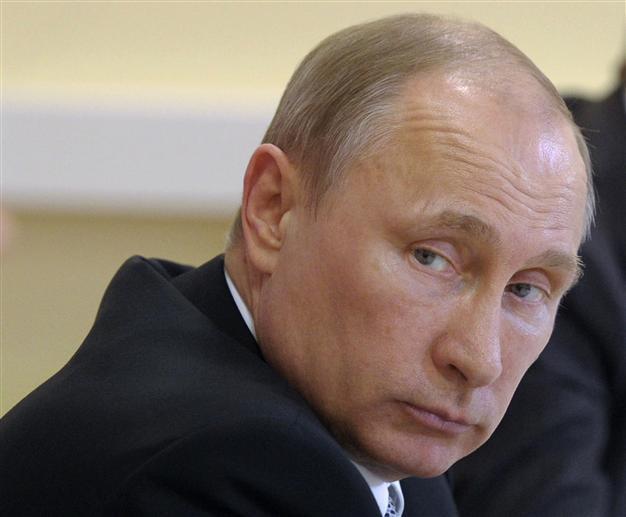Putin says sanctions could hurt Western energy firms in Russia
MOSCOW - Agence France-Presse

Russian President Putin chairs a meeting during his visit to Petrozavodsk in Russia's Republic of Karelia, REUTERS Photo
President Vladimir Putin on April 29 warned that new EU and U.S. sanctions could impact the work of Western energy firms in Russia and denied there were any Kremlin forces in eastern Ukraine."If this continues, we will of course have to think about how (foreign companies) work in the Russian Federation, including in key sectors of the Russian economy such as energy," Putin told reporters in televised comments from a regional summit in Minsk.
The United States has warned that it may soon unveil sanctions against the Russian energy and banking sectors should the Kremlin fail to help ease the crisis engulfing its western neighbour.
Putin's comments threaten the operations of some of the world's biggest energy companies in the resource-rich state - once viewed as a reliable alternative to unstable natural gas and oil producing countries in the Middle East.
Russia's main state oil firm Rosneft has struck a series of energy production deals with companies ranging from the US super-major ExxonMobil to Norway's Statoil and Italy's ENI.
Government-held natural gas giant Gazprom is also working with the Anglo-Dutch energy group Royal Dutch Shell off Russia's Pacific coast.
Washington on April 29 slapped a travel ban and asset freeze on Rosneft chief Igor Sechin - one of seven officials named on a new sanctions listed that also included 17 Kremlin-linked companies.
These measures do not directly impact the company's operations in the West, and BP on Monday said it remained committed to both Rosneft and Russia.
The veteran Russian leaders said he saw no logic behind the latest wave of sanctions against Russia and accused the United States of pushing Ukraine toward crisis by backing the interim leaders who toppled a pro-Kremlin president in February.
And he firmly rejected charges that he was fomenting unrest in eastern Ukraine by dispatching special forces and agents who were leading attacks on key government buildings in cities such as Donetsk and Slavyansk.
"There are neither Russian instructors, nor special units, nor troops there," said Putin. The Kremlin chief separately noted that he hoped to see the quick release of seven European military observers detained by pro-Kremlin separatists in Slavyansk.
"I hope that this conflict will be resolved and that they are able to freely leave the territory (of Ukraine)," said Putin.
But he said the unarmed military observers from the Organisation for Security and Co-operation in Europe (OSCE) had put themselves in needless danger by failing to agree their visit to Slavyansk with the rebels in control of the town, and also criticised Kiev for inviting them to Ukraine.
"All those involved in what happened should draw corresponding conclusions from what happened," said Putin.
"If the government - or those who now call themselves the government - invited some sort of observers... then these (observers) should have understood that they were entering a conflict zone, a region of the country that does not recognise the authorities' legitimacy," he said.
"They should have thought about that in advance, and agreed (their mission) with the people who control this territory."
















